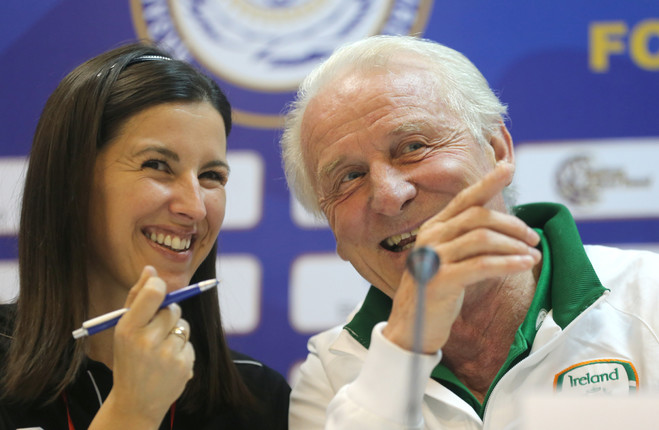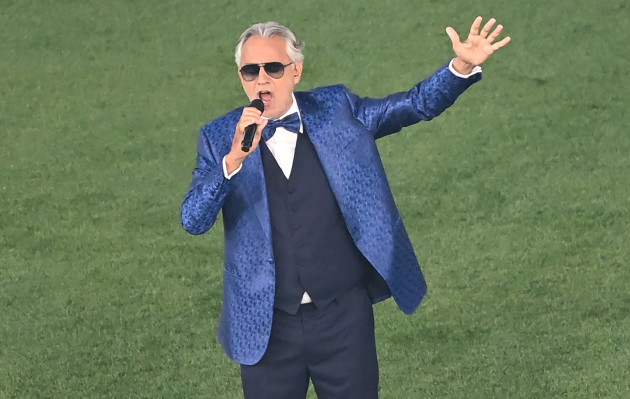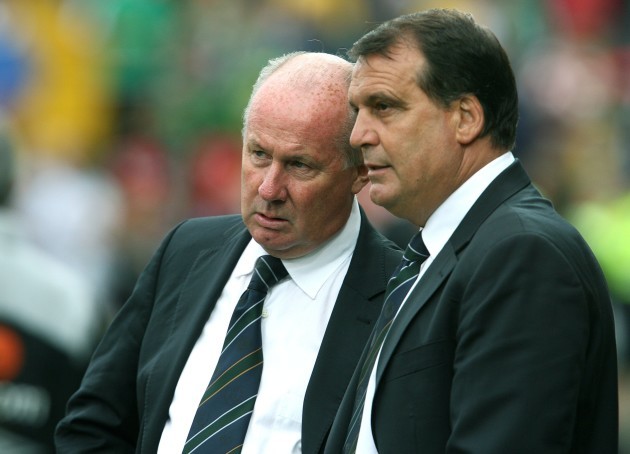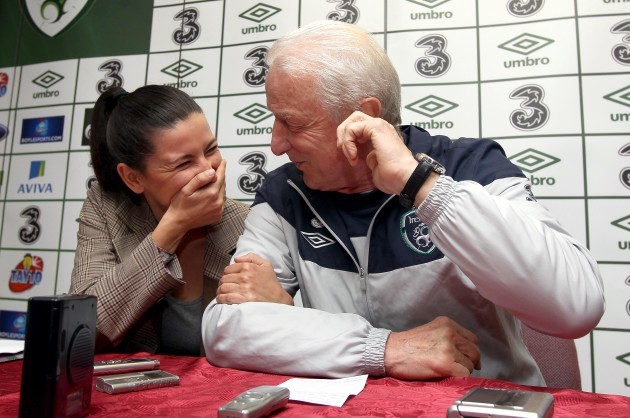LAST UPDATE | 16 Jun 2021
WHEN MANUELA Spinelli moved to Ireland from Italy in 1993, she had seemingly left her dreams of involvement in high-level sport behind.
Spinelli was once an accomplished judo athlete, but injuries put paid to that career.
“I come from sport,” she tells The42. “I did judo for 20 years of my life, so I did it at a high competitive level. I love and understand sport.
“I would go to school and then train. We’d spend the best part of four hours in the gym every day. I had competitions at weekends, it was full-on. My dad was the president of the judo association, so that helped in terms of parents understanding what is involved and my brother did judo as well, which is how I started, wanting to be like him.
“And my mum never really liked the idea, because I broke every bone in my body, but it’s always been part of our life really until I moved to Ireland.”
She continues: “I stopped through injuries. I could no longer compete at a high level and I could no longer be in the national team. When you’re training like a machine, you have a slightly wrong perception of what sport is [laughs].
“For me, sport was always the adrenaline of winning and competing and doing it semi-professionally, it’s never been about fun, unfortunately.”
Spinelli began studying at UCD after moving to Ireland, though she was not tempted to join the college’s judo team.
“For me, being unable to do it at a high level, it just wasn’t the same. I completely stopped doing any sport. In fact, I had a rejection of doing any sport for fun. Now, they re-train athletes when they stop doing sport competitively — I think that’s a wonderful idea.”
From there, Spinelli graduated from Belfield and did a year abroad in Germany, before completing a master’s degree in Trinity.
“Why I came over originally was to literally learn English. I always wanted to be an interpreter. Of course, I picked a country where there wasn’t an interpreting school at the time, but I just didn’t want to go to England. Nothing against England, I just preferred Ireland as a destination. I knew the country because I used to come on my summer holidays with the school. So I was already familiar with it and I liked the idea of moving to rural Ireland at the time — it certainly wasn’t the Ireland of today.”
In 2008, Spinelli applied for a job with the Football Association of Ireland as an interpreter. Originally, it was supposed to be a two-day gig. Ultimately, it lasted far longer and brought her a degree of fame. Was it, on some level, an attempt to reconnect with high-level sport, after her judo career had ended prematurely?
“Yeah, absolutely. When I got the job with the FAI, I had already been involved with sport. One of my first clients was World Rugby and back then, what used to be called the Heineken Cup and Six Nations, were all based in Dublin. In fact, they’re still my clients. But I started in rugby, in terms of sports interpreting. It was then thanks to my experience interpreting in rugby that I got the job in football.
“I don’t know how many people applied for the job. I remember there were people coming over from England.
“So it was a lengthy process, which is very unusual for interpreting, for what was originally a two-day job.”
So what exactly was the role? Only working with one of the most famous figures in her native country, who happened to have a very idiosyncratic style of communication.
By that stage, Giovanni Trapattoni had done virtually everything in football. As a player at AC Milan, he had won two Serie A titles and two European Cups, in addition to winning 17 caps for Italy, featuring in their squad at the 1962 World Cup. As a manager, he is only one of five coaches to win league titles in four different European countries, including six for Juventus alone. And along with Udo Lattek, he is the only manager to have won all three of the European Cup, Cup Winners’ Cup and Uefa Cup.
Boasting this incredible CV, at the age of 68, he was improbably announced as Ireland manager following Steve Staunton’s brief and unsuccessful tenure.
Spinelli’s first task was to act as an interpreter when Trapattoni, along with fellow Italian legend and then assistant coach Marco Tardelli, was introduced to the media.
“I had worked with [Italian opera tenor] Andrea Bocelli and other high-profile names, but never in a press-facing or public-facing position. It certainly would have been my first experience in terms of public interpreting and yes, very new and very intimidating. Although I have a very public personality, I’m definitely not an introvert, but it was rather intimidating because you’re literally catapulted onto a stage, with a zillion people in front of you. So not the easiest thing to do, but they put me at ease. Certainly, Giovanni is an old fox. He put me at ease immediately, because of his canny personality as well. I relaxed into the job pretty soon really.”
And had Spinelli followed Trapattoni’s career closely and formed any preconceived ideas about the man up to that point?
“He’s one of these characters who are extremely famous in Italy. Everybody knows him. In Italy, we have a joke that it was like the pope and then Trapattoni. Everybody knows of his quirky personality and communication skills [laughs], for want of a better word. And I would have known of him through the press obviously. But certainly an endearing character and someone everybody loved in Italy. We’re like 10k apart. He comes from very close to where I’m from, so there’s also a cultural similarity, despite the fact that I’ve been in Ireland for half my life now.”
She continues: “I work in communications, and from him, I certainly learned new communication skills, put it that way. He’s one of these people who can communicate even without speaking a language. So definitely the approach he had when it came to communicating with the press, you could write a book about it.
“But for me, the main thing is the humbleness of him and Marco. I’m not sure about Liam [Brady]‘s background, but he certainly comes across as a humble person.
“The making of a team, which is not necessarily selecting the best players available, but creating that sense of group. A team if you’re attacking or defending, in the old-style sense of the team. And as a member of staff, I certainly felt part of the team as well. They were very inclusive for sure. I guess I had the advantage of the language as well. So I really lived it as a 24-7 experience — I would sit with them, talk to them, spend a lot of time with them, it was kind of like a travelling family. It’s a bubble when you’re travelling with the team. It’s like being on tour with the band. And if the bubble is not nice, you wouldn’t stay there.”
So while Spinelli remained on a freelance basis, what was initially a temporary job became a continuous one.
“When I first started, I had 100% involvement in everything that was going on. I was on the side of the pitch at training, I was a very important part of the whole team. Liam spoke Italian, but Marco had very little English and Giovanni had next to none. Liam looked after the technical side of things for sure. Obviously, that was his job. But I would have been present everywhere else because there was nobody else within the set-up who spoke Italian.
“Not that I ever did an administrative job at all, but I would have functioned as an in-between — Giovanni and operations, Giovanni and communications, Giovanni and training, whereas once the FAI hired Italian-speaking staff, those roles were automatically absorbed by the staff themselves. So my job became more and more about interpreting at press conferences, meetings, interviews or television.”
Trapattoni remains the only Irish manager ever to qualify for the Euros in its 16-team format. Jack Charlton did so for the 1988 event, when only eight nations made it through, while Martin O’Neill managed to qualify in 2016 after the competition had been expanded to include 24 sides.
It’s now nine years since ‘Trap’s army’ descended on Poland. Spinelli retains fond memories of the festivities surrounding that tournament while acknowledging how things didn’t go according to plan on the pitch, as Ireland were drawn in the Group of Death and lost all three of their games against Croatia, Spain and Italy.
“It might sound silly and not sports-related, because frankly, from a sporting point of view, we didn’t exactly excel at those Euros. But for me, it was the whole travelling with the Irish fans. The Irish fans always had this amazing reputation in big tournaments. I had never lived it first-hand, and to live it first-hand was really incredible. The number of people who travelled to Poland was just crazy. It was a real experience. You don’t understand it unless you live it. This sense of constantly being surrounded by people. I just did my job. I became known, simply because I stood beside him. But for me, it was very unusual to have that level of attention and warmth. Everybody knows you and you’re kind of expected to have time for everybody.
“We went out to the Irish village once and it was like being on a holiday, it was hilarious. But I enjoyed being with the team all the time.
“It wasn’t an easy tournament, obviously. There were a lot of complications in terms of the availability of players. At that point, the relationship between Trap and the public, I wouldn’t say it had deteriorated, but he wasn’t winning. The public is on your side until you don’t win, and then it gets a little bit complicated and everybody has an opinion.
“But in my humble opinion, the ability of Trap and some of his team selections were always aimed at the good of the team, as opposed to: ‘Oh, he’s a good player, so he must play.’
“Sometimes, criticism annoyed him, but he never doubted what he was doing. He had a strategy and he would continue with that strategy. The strategy was based not on what anybody else thought, but entirely on what he saw in the players. He certainly would have not been affected by public opinion, that’s for sure.”
And despite having secured almost every trophy in the game, as is invariably the case with a serial winner, there is no doubt that Trapattoni cared deeply about Ireland and the team performing well.
After the Boys in Green beat Estonia away 4-0 in the play-off first leg, thereby effectively sealing their place at the Euros, two years on from the heartbreak of narrowly missing out on qualification for the 2010 World Cup, a tearful Trap told RTÉ: “We are proud of our players. I am a little bit emotional and it’s important because the team believe us. We choose the 11 go on the pitch. Sometimes choose one, sometimes other. But all answer us with the same mentality, attitude, personality.”
Spinelli adds: “He takes it really personally. He’s old school. What he does, he does with a passion, and he believes in what he does.”
And with eight years having passed since Trapattoni stepped down as Ireland manager following a disappointing post-Euros World Cup qualifying campaign, does he look back on the experience positively overall?
“He always really speaks warmly of his experience in Ireland. He loved the people.
“We’re very similar and he has fond memories of Ireland. Obviously, a couple of not regrets, but things could have gone differently in Paris and we all know that. But it is what it is. He always said ‘football is round,’ so it’s never going to go exactly where you want it. ‘You never know how it bounces,’ he used to say.
“In terms of public opinion or criticism, he used to say: ‘Ultimately, these are just words, I look at facts.’ In other words, you can talk until the cows come home, but the results will stay and your words will be forgotten.
“He was a great person, an amazing person to work with, both him and Marco. Real people. I’m very fond of them, I’m still in touch with them, I have all the time in the world for them.”
While Trap is now 82 and the Ireland job appears to have been his last in management, Spinelli is still interpreting to this day, 28 years on from leaving Italy.
“You can say I have two lives. I like to say that they’re both based on communication, or cultural interpretation if you will. So I’m still interpreting. I still do a lot of work in sport. I do a lot of work with the Vatican, funnily enough. And then I work in food. I’ve been working in food for a very long time. And it was always the less prominent part of my work. Then it so happened that it became the more prominent part of my work and I run an association of chefs. And I mainly deal with events and communication (more info here)
“I’m always busy, put it that way, but also always open to new opportunities. I absolutely love what I do in both fields, so I’m very lucky in that sense. I work hard, but it pays off.”
We briefly touch on the current controversy in relation to press conferences. Spinelli has tremendous sympathy for Naomi Osaka and her predicament while acknowledging the continuing importance of the media as an interlocutor between athletes and the general public.
Yet what’s striking when you type the words ‘Manuela’ and ‘Trapattoni’ into the search engine of the Inpho sports photography website, in at least 50% of the images that crop up, Spinelli is either smiling or laughing (often the latter). It is perhaps a timely reminder that press conferences, while frequently testy and tense affairs, can also, at least occasionally, be fun.
Spinelli laughs frequently over the course of our conversation as well, reflecting on various Trap-related memories, and before we conclude, I ask for her favourite anecdote from that time.
There are so many, she says, most of which have already been documented. Spinelli promises she will think about it though, and a few days later, she texts back.
It relates to Trap’s most famous quote during the Irish years. Ahead of the vital Euro 2012 play-off, he said: “Don’t jump the gun. In Italy, it is another meaning but the same. Be careful the cat, no say the cat is in the sack when you have not the cat in the sack.”
The ‘cat is in the sack’ quote attracted countless headlines and became a recurring phrase, thereby enhancing Trap’s reputation as a lovable eccentric.
It felt strangely appropriate, therefore, when the team arrived at their Montecatini Terme camp prior to the Euros and happened to discover an actual cat lying on the table of the press room, staring back at them enigmatically.




